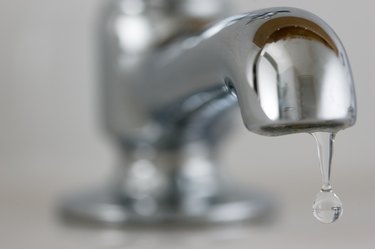We've discovered this great article involving 9 Reasons for Low Water Pressure in Your House listed below on the net and reckoned it made sense to talk about it with you on this site.

Low water stress in your house can be an irritating issue, influencing everything from showering to washing dishes. If you're experiencing weak water flow, there are numerous feasible causes and solutions to check out. In this overview, we'll go over usual reasons for low tide stress and practical steps to attend to the issue successfully.
Intro to Low Tide Pressure
Low tide stress takes place when the circulation of water from your faucets, showers, and other fixtures is weaker than typical. This can make daily jobs more challenging and less efficient. Understanding the reasons for low water pressure is important to locating the ideal option.
Typical Root Causes Of Low Water Pressure
Pipeline Obstructions
Gradually, pipelines can end up being clogged with mineral deposits, debris, or debris, restricting the circulation of water. This is a common concern in older homes with galvanized steel pipelines.
Rust
Corrosion within pipelines can lead to leakages and decreased water stress. Rust buildup can restrict water circulation, particularly in maturing plumbing systems.
Faulty Pressure Regulators
Stress regulatory authorities are in charge of keeping consistent water pressure in your home. If they malfunction, it can result in low water stress or unequal circulation throughout the house.
Community Supply Of Water Issues
Occasionally, the problem lies outside your home. Local water system concerns, such as main line leakages or upkeep job, can momentarily reduce water pressure in your area.
Exactly How to Diagnose Low Water Pressure
Checking Taps and Components
Beginning by checking the water stress at different taps and fixtures throughout your home. If the issue is separated to details locations, it may indicate local issues.
Evaluating Pipes
Inspect noticeable pipelines for signs of leakages, rust, or blockages. Pay attention to any uncommon sounds, such as knocking or rattling pipes, which can indicate concerns within the plumbing system.
Consulting with a Plumber
If you're not able to determine the root cause of low water pressure, take into consideration employing an expert plumber to carry out a thorough examination. They can determine underlying concerns and suggest ideal services.
Do It Yourself Solutions to Repair Low Water Stress
Cleansing Aerators and Showerheads
Mineral deposits can collect in aerators and showerheads, reducing water flow. Eliminate and clean up these elements consistently to improve water stress.
Flushing Hot Water Heater
Debris build-up in the hot water heater can restrict flow and lower performance. Flushing the tank periodically aids get rid of sediment and maintain optimal performance.
Examining Pressure Regulator
Make certain that the stress regulator is operating properly. Adjusting or changing the regulator can help bring back proper water stress throughout your home.
Clearing Up Clogs in Water Lines
For minor obstructions, attempt using a plumbing serpent or chemical drainpipe cleaner to clear obstructions in pipelines. Beware when using chemicals and comply with safety standards.
When to Call a Professional Plumber
If DIY initiatives fail to deal with the problem or if you believe significant plumbing problems, it's best to seek support from a qualified plumber. They have the know-how and devices to resolve intricate concerns securely and efficiently.
Preventive Measures to Maintain Water Pressure
Regular Upkeep
Set up regular maintenance for your plumbing system to prevent issues such as rust, leaks, and blockages. Dealing with small troubles early can assist avoid even more considerable repair work in the future.
Installing a Stress Booster
Think about installing a stress booster pump to enhance water stress in areas with constantly low circulation. This can be particularly beneficial for multi-story homes or residential or commercial properties with high-demand fixtures.
Surveillance Water Usage
Be mindful of water use practices and stay clear of ill-using the plumbing system. Simple changes, such as astonishing showers and washing lots, can assist keep ample water stress.
Verdict
Handling low water pressure can be irritating, yet determining the underlying causes and applying suitable remedies can restore ideal circulation throughout your home. Whether it's cleansing aerators, inspecting pipes, or talking to a plumber, taking positive steps can guarantee a stable supply of water for your daily requirements.
FOUR WAYS TO FIX LOW WATER PRESSURE NOW
Turning on a shower or faucet only to find the water comes out in a sad, slow drizzle is never a good feeling. How exactly are you supposed to wash a pan or take a quick shower when it takes 10 minutes just to rinse off a little soap? The good news is that when your water pressure is bad, there's always a cause: typically one that can be easily fixed. Here are some of the most common causes of low pressure and what you can do to fix the issue:
DEBRIS AND MINERAL DEPOSIT BUILDUPS
If you notice low water pressure from just one or two of the fixtures in your house, the problem likely has to do with debris buildup. Water is full of minerals and other debris, all of which can accumulate in your pipes and on your fixtures. This can cause a blockage that affects how much water flows through. To fix this, try filling a small plastic bag with white vinegar, and use a rubber band to hang it around your showerhead or faucet. Let the head of the fixture soak for a few hours, and the vinegar should loosen the deposits.
WATER LEAKS
Leaks are another common cause of low water pressure. If water is flowing out of your plumbing through a hole or crack before it can reach your fixture, the pressure coming out of the faucet or showerhead will be lower. A plumbing professional is your best bet for finding and repairing a leak in your water supply pipes.
Leaks are another common cause of low water pressure. If water is flowing out of your plumbing through a hole or crack before it can reach your fixture, the pressure coming out of the faucet or showerhead will be lower. A plumbing professional is your best bet for finding and repairing a leak in your water supply pipes.
FOUR WAYS TO FIX LOW WATER PRESSURE NOW
Turning on a shower or faucet only to find the water comes out in a sad, slow drizzle is never a good feeling. How exactly are you supposed to wash a pan or take a quick shower when it takes 10 minutes just to rinse off a little soap? The good news is that when your water pressure is bad, there's always a cause: typically one that can be easily fixed. Here are some of the most common causes of low pressure and what you can do to fix the issue:
DEBRIS AND MINERAL DEPOSIT BUILDUPS
If you notice low water pressure from just one or two of the fixtures in your house, the problem likely has to do with debris buildup. Water is full of minerals and other debris, all of which can accumulate in your pipes and on your fixtures. This can cause a blockage that affects how much water flows through. To fix this, try filling a small plastic bag with white vinegar, and use a rubber band to hang it around your showerhead or faucet. Let the head of the fixture soak for a few hours, and the vinegar should loosen the deposits.
WATER LEAKS
Leaks are another common cause of low water pressure. If water is flowing out of your plumbing through a hole or crack before it can reach your fixture, the pressure coming out of the faucet or showerhead will be lower. A plumbing professional is your best bet for finding and repairing a leak in your water supply pipes.
Leaks are another common cause of low water pressure. If water is flowing out of your plumbing through a hole or crack before it can reach your fixture, the pressure coming out of the faucet or showerhead will be lower. A plumbing professional is your best bet for finding and repairing a leak in your water supply pipes.
A VALVE ISSUE
If you have low water pressure throughout your home, check your main shut-off valve to make sure it's completely open. You may also want to see if there's a pressure-reducing valve installed. If there is, have a plumber help you adjust the settings to get the pressure you're looking for.
OTHERS USING WATER
Believe it or not, your low water pressure could be caused by your neighbors. If you notice low pressure at certain times of day, it may be because you and the people living next to you have similar schedules - when everyone is showering at the same time, the pressure will be lower in every home. Low pressure throughout the neighborhood may also be caused by an issue with your municipal water supply. If that's the case, call the supplier to see if they're working on the issue.
https://www.rotorooter.com/blog/water-leaking/low-water-pressure-fixes/

I found that blog entry on while browsing the web. Loved our blog? Please quickly share it. Help someone else check it out. I appreciate your readership.
Call